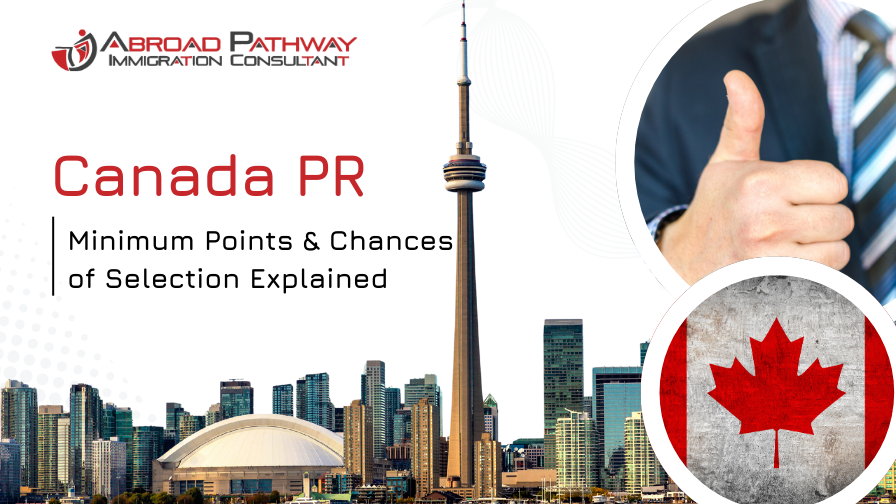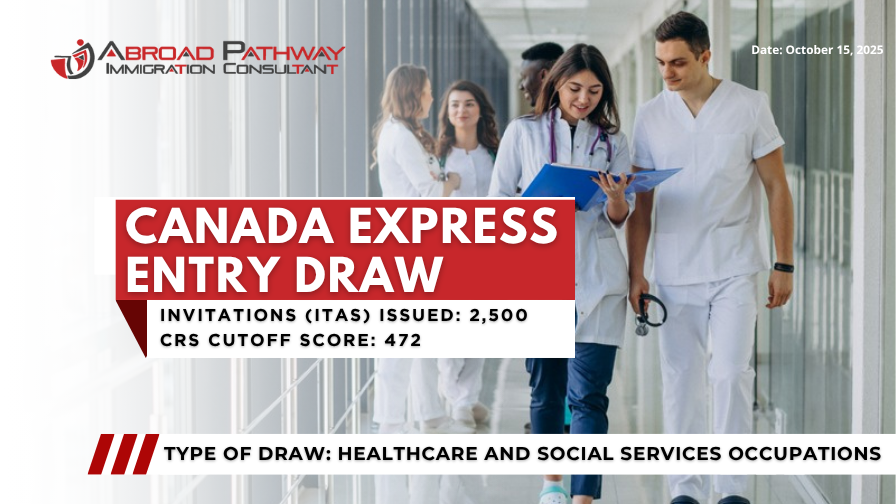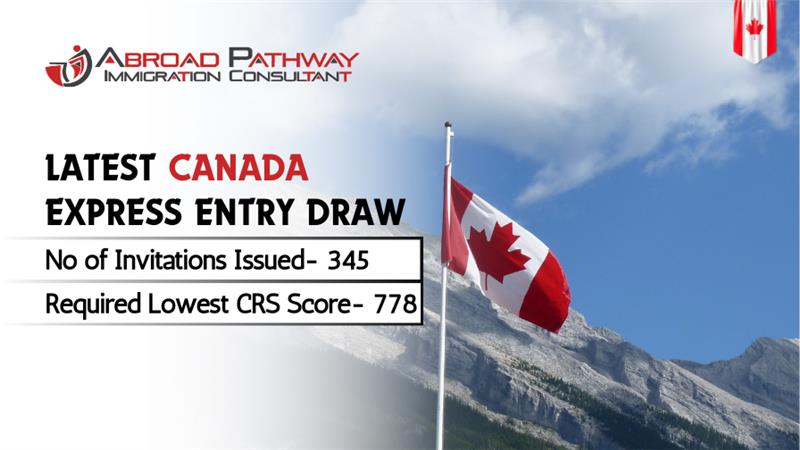Table of Content
1. IELTS Band required for Canada Immigration
3. Understanding the IELTS format
6. IELTS requirement for Canada PR visa
- Federal Skilled Worker Program (FSWP)
- Federal Skilled Trades Program (FSTP)
- Canadian Experience Class (CEC)
- Provincial Nominee Programs (PNPs)
7. IELTS Score Requirements for Programs
8. IELTS Score Required to Get PR in Canada in 2026
10. Tips to get a good score in IELTS
What is the IELTS Band required for Canada Immigration?
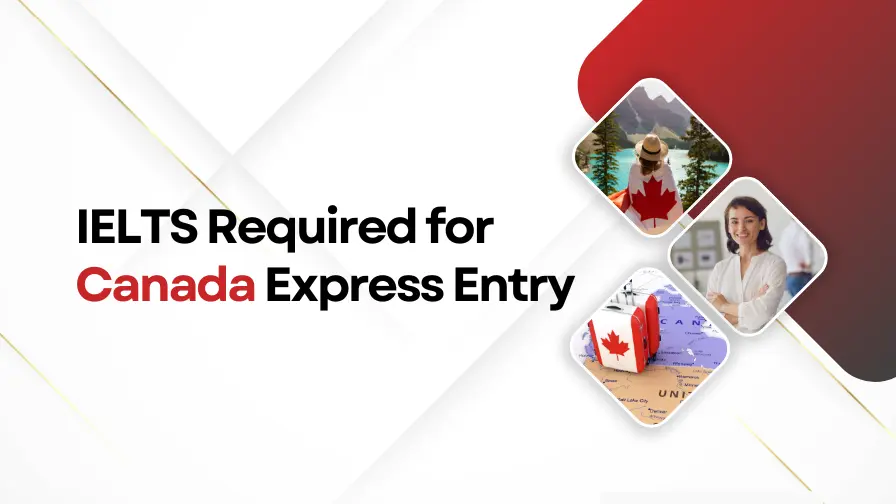
One of the major requirements for those who are planning to immigrate to Canada is the language proficiency score in French or English language. Getting a high score in language can improve your overall Comprehensive ranking system (CRS) score and can make a big difference to your application.
The most common test for the French language is Test De Connaissance du Francais (TCF). For English language test-takers there are two options:
- Canadian English Language Proficiency Index Program (CELPIP)
- International English language Testing System (IELTS)
The Canada government accepts both these tests, and which test you take will depend on you completely. However, there are certain aspects which you should consider before you make a choice.
| IELTS Test Component | Duration | Brief Description |
| Listening | 30 minutes | 4 sections, 40 items |
| Reading | 60 minutes | 3 sections, 40 items |
| Writing | 60 minutes | 3 tasks |
| Speaking | 11-14 minutes | 3 part one-on-one conversation |
Each skill is scored on a band scale of 1 to 9, where:
- Band 1: Non-user
- Band 2: Intermittent user
- Band 3: Extremely limited user
- Band 4: Limited user
- Band 5: Modest user
- Band 6: Competent user
- Band 7: Good user
- Band 8: Very good user
- Band 9: Expert user
| IELTS Canada PR | Basic | Basic+ | Okay | Good | Better | Best |
|---|---|---|---|---|---|---|
| Listening | 4.5-5 | 5.5 | 6-7 | 7.5 | 8 | 8.5-9 |
| Reading | 3.5-4 | 5 | 6 | 6.5 | 7 | 8-9 |
| Writing | 4-5 | 5.5 | 6 | 6.5 | 7 | 7.5-9 |
| Speaking | 4-5 | 5.5 | 6 | 6.5 | 7 | 7.5-9 |
IELTS TO CLB CALCULATOR:
IELTS Score for Canada PR
IELTS (International English Language Testing System) is a popular evaluation exam of the English language. The candidates capability of the English language is tested in all forms – Spoken, written, comprehension etc. The applicant is allotted a score in bands and the range is from 0 to 9 which the score of 0 band been allotted to a highly incompetent person and the band of 9 for an expert in the language. Ideally the Band 6 or 7 is considered to be a decent IELTS score. The test scores are valid for two years from the time of taking the test thus One should always plan the test as per the immigration plans.
Understanding the IELTS format
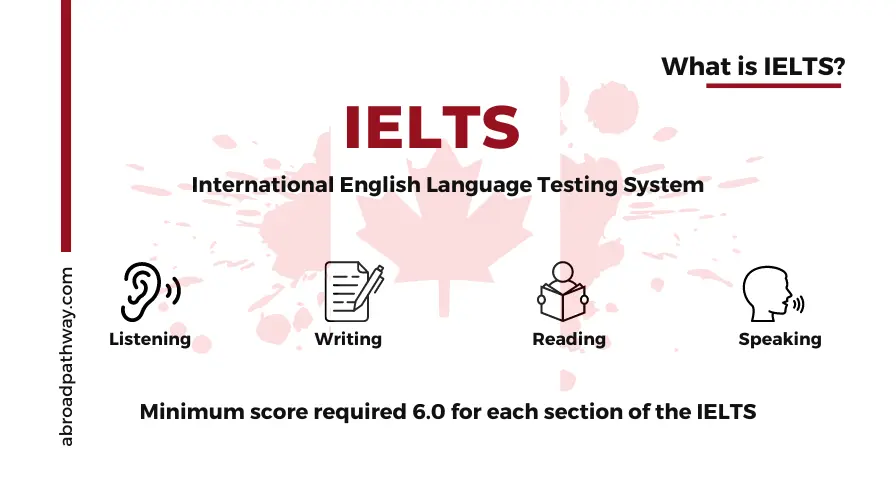
There are two types of IELTS test and depending on the reason for immigration the test can be undertaken. The two types are –
- Academic version
- General Training version.
The Academic Section is aimed at students who would like to pursue higher studies in U.K, USA, Canada and Europe. The general examination is for people who would like to migrate to the other country in case of work opportunities. In both the versions, the test is divided into four sections-
- Reading,
- Speaking,
- writing
- listening
The first three parts - Reading, writing and listening can all be taken in one day. For the speaking section the candidate will be called after a week to take the test. The speaking test is taken under a certified examiner and it is an interactive session based on real life situation. The test accesses the wide array of skills in an applicant – Ability to organize ideas, speak at length and express oneself clearly.
Presently 89 countries are conducting the IELTS test. These tests are available in popular Canadian Permanent residence countries like Bangladesh, Brazil, Canada, China, Columbia, Egypt, France, India and South Korea, and many others.
Similarities:
Remember that both the IELTS Academic and General Training tests evaluate four language skills: Listening, Reading, Writing, and Speaking. Each test lasts 2 hours and 45 minutes. The Listening and Speaking sections are the same in both tests, but the Reading and Writing sections are different.
Test Structure:
- Listening: 30 minutes
- Reading: 60 minutes
- Writing: 60 minutes
- Speaking: 11-14 minutes
Differences:
1. Purpose:
- IELTS Academic: Those who want to seek professional registration or further study in an English-speaking setting might find this edition ideal. It assesses a candidate's readiness for starting a professional career or for education.
- IELTS General Training: This test is suitable for those migrating to an English- speaking country (e.g., Canada, Australia, the UK) or for individuals seeking work experience or training programs. It focuses on basic survival skills in broad social and workplace contexts.
2. Reading Section:
- Academic: The reading materials include three long texts ranging from descriptive and factual to discursive and analytical. These materials, which come from books, journals, periodicals, and newspapers, are suitable for anyone registering professionally or starting college courses.
- General Training: The reading materials include company handbooks, guidelines, notices, ads, book, magazine, newspaper extractions. In an English-speaking world, these books most certainly come across daily.
Writing Section:
- Academic: Candidates in Task 1 must either explain, summarise, or describe material shown in a graph, table, chart, or diagram. With an eye towards formal academic language, Task 2 consists in producing an essay in response to a point of view, argument, or problem.
- General Training:Candidates in Task 1 have to draft a letter depending on a specified scenario, maybe official, semi-formal, or personal. Like the Academic test, Task 2 consists in producing an essay in response to a point of view, argument, or topic, but it can be less formal.
Comparison Table:
| Section | IELTS Academic | IELTS General Training |
| Listening | Identical for both tests | Identical for both tests |
| Reading | Three long academic texts | Extracts from daily life materials |
| Writing | Task 1: Describe/interpret data from charts/graphs Task 2: Formal essay |
Task 1: Write a letter Task 2: Essay (less formal) |
| Speaking | Identical for both tests | Identical for both tests |
What is CLB in IELTS Test Score?
CLB means Canadian Language Benchmarks. The score that is obtained in the IELTS test is in bands and it is then converted into CLB (CLB to IELTS Converter) equivalent by the Canadian immigration authorities. There is a relationship between your IELTS score and your desired CLB for Canada PR visa. Every CLB level is equivalent to a particular score in IELTS and it is added to your CRS points under the Language Proficiency criteria.
The IELTS Point score Table
CLB Level and IELTS Scores
| CLB Level | Points per subcategory | Listening | Reading | Speaking | Writing |
| 7 | 4 | 6.0-7.0 | 6.0 | 6.0 | 6.0 |
| 8 | 5 | 7.5 | 6.5 | 6.5 | 6.5 |
| 9 | 6 | 8.0 | 7.0 | 7.0 | 7.0 |
| 10 and above | 6 | 8.5-9.0 | 8.0-9.0 | 7.5-9.0 | 7.5-9.0 |
| CLB Level | Without Spouse | With Spouse |
| Less than 4 | 0 | 0 |
| CLB 4 or 5 | 24 | 24 |
| CLB 6 | 32 | 32 |
| CLB 7 | 68 | 64 |
| CLB 8 | 92 | 88 |
| CLB 9 | 124 | 116 |
| CLB 10 or More | 136 | 128 |
IELTS requirement for Canada PR visa
The three core stream of Canada PR visa under the Express Entry Program are -
The IELTS test results of the applicant needs to be valid for the full six-month period then only the IRCC will process your application for the Canada PR visa. In case the applicant is applying through the Express Entry Program then the required minimum CLB score is 7 for language proficiency or if you calculate it with the IELTS score then it is an 6.0 overall to qualify for permanent residency.
For Canada immigration there are different programs and each program has its own language competency requirements. There are parts like Listening, reading, writing, and speaking which are the four subcategories used to evaluate your language abilities. Your points are distributed in accordance with your CLB Level (Canadian Language Benchmark).
Federal Skilled Worker Program (FSWP)
If you are applying through the express entry program and the official language of your choice is English then to be selected under the Federal Skilled Workers program the applicant will not get points if he scores less than CLB 4. The maximum points for the language skills is 34 or 32 and this is allotted to the applicant if your CLB score is 10 or above (if you are married).
For detailed process of Federal Worker Program Click Here
For those applicants who meet the following per-section standards and English is their second language then they will receive a total of 4 points.
| CLB Level | Total Points | Listening | Reading | Speaking | Writing |
| 5 and above | 4 | 5.0-9.0 | 4.0-9.0 | 5.0-9.0 | 4.0-9.0 |
Federal Skilled Trades Program (FSTP)
For those applying through the FSTP the Canada pr points table needs to be met as below -
| CLB Level | Listening | Reading | Speaking | Writing |
| 4 | 4.5 | 3.5 | 4.0 | 4.0 |
| 5 | 5.0 | 4.0 | 5.0 | 5.0 |
| 6 | 5.5 | 5.0 | 5.5 | 5.5 |
| 7 | 6.0 | 6.0 | 6.0 | 6.0 |
| 8 | 7.5 | 6.5 | 6.5 | 6.5 |
| 9 | 8.0 | 7.0 | 7.0 | 7.0 |
| 10 and above | 8.5-9.0 | 8.0-9.0 | 7.5-9.0 | 7.5-9.0 |
For detailed process of Federal Skilled Program – Click Here
Canadian Experience Class (CEC)
There are different NOC positions for the applicants to apply. Those applicants who are applying through the Skill level A they need to have a CLB score of 7 for others who are applying through the Skill type B and C their CLB requirement is 5 points. The Point score requirement as per the CLB is listed below-
| NOC | CLB Level | Listening | Reading | Speaking | Writing |
| A | 10 and above | 8.5-9.0 | 8.0-9.0 | 7.5-9.0 | 7.5-9.0 |
| A | 9 | 8.0 | 7.0 | 7.0 | 7.0 |
| A | 8 | 7.5 | 6.5 | 6.5 | 6.5 |
| A | 7 | 6.0 | 6.0 | 6.0 | 6.0 |
| B | 6 | 5.5 | 5.0 | 5.5 | 5.5 |
| B | 5 | 5.0 | 4.0 | 5.0 | 5.0 |
There are other aspects as well based on which the applicants are assessed and these include areas such as language ability, age, education, and work experience.
For detailed process of Canadian Experience Class Click Here
Provincial Nominee Programs (PNPs)
Provincial Nominee Programme (PNP) criteria differ depending on province. Like the FSWP, most PNPs normally demand a minimum IELTS score comparable to a CLB level of 7. Some regions, meanwhile, can allow lesser marks for specific streams. Under the Saskatchewan Immigrant Nominee Programme (SINP), for instance, a CLB level of 4 would translate to an IELTS score of 4.5 in Listening, 3.5 in Reading, 4.0 in Writing, and 4.0 in Speaking.
Minimum IELTS Scores for PNPs: Generally, most PNPs require a minimum IELTS score equivalent to a CLB level of 7.
| Province | CLB Level | Listening | Reading | Speaking | Writing |
| General PNPs | 7 | 6.0 | 6.0 | 6.0 | 6.0 |
| Saskatchewan | 4 | 4.5 | 3.5 | 4.0 | 4.0 |
IELTS Score Requirements for Different Immigration Programs
Express Entry Program
Federal Skilled Worker Program (FSWP):
- Minimum CLB Level: 7
- IELTS Scores: 6.0 in Listening, Reading, Writing, and Speaking
Federal Skilled Trades Program (FSTP):
- Minimum CLB Level: 5 for Listening and Speaking, 4 for Reading and Writing
- IELTS Scores:
-
- CLB 5: Listening 5.0, Reading 4.0, Speaking 5.0, Writing 5.0
- CLB 4: Listening 4.5, Reading 3.5, Speaking 4.0, Writing 4.0
Canadian Experience Class (CEC):
- NOC TEER 0 or 1(higher-skilled jobs):
-
- Minimum CLB Level: 7
- IELTS Scores: 6.0 in all sections
- NOC TEER 2 or 3 (technical and skilled trades):
-
- Minimum CLB Level: 5
- IELTS Scores: Listening 5.0, Reading 4.0, Speaking 5.0, Writing 5.0
Provincial Nominee Programs
General PNPs:
- Minimum CLB Level: 7
- IELTS Scores: 6.0 in each section
Saskatchewan Immigrant Nominee Program (SINP):
- Minimum CLB Level:4
- IELTS Scores: Listening 4.5, Reading 3.5, Speaking 4.0, Writing 4.0
Other Pathways (e.g., Family Sponsorship)
There are no specific IELTS scores required for family sponsorship programmes. The primary emphasis of these programmes is on the relationship between the sponsor and the sponsored individual, not on language proficiency. Nonetheless, the sponsored individual may benefit from a strong command of English or French in terms of employment and integration into Canada.
IELTS Score Required to Get PR in Canada in 2026
“The minimum IELTS score required to meet the points requirement for the Canada PR is overall 6.0 band and a minimum band in each section for selection. It is important for an applicant to get the minimum IELTS band . Although the language test is not a mandatory category for selection of skilled applicants but it is difficult to meet the point score required for eligibility in the Canada PR visa without meeting the language test score. For skilled workers they need to have the Canadian language benchmark(CLB ) level 7 to qualify for a PR visa.
What is the cost of IELTS Test?

The IELTS test fee is Rs 17000 Generally which is subject to change as per the updates of the authorities. Based on your preference you can take either the paper back test or the computerised test.
Tips on how to get a good score in the English Language test
- Be prepared: It is good to go for the test only after full preparation. You can solve the previous year’s question papers and practice your skills. It will help you overcome the difficulties in comprehending how to undertake the test. The more you practice, the better it is to meet almost all the ordeals that might arise in the test.
- Study under the guidance of a Mentor: Even if you are proficient in the English language, it is always better to proceed forward under the guidance of a good mentor only. A mentor will be able to guide you on how to undertake the take and also help you overcome your mistake. Some of the good immigration consultancies have mentors to help their clients with the IELTS test.
- Use your preparation time wisely: There is a preparation time allotted before listening and speaking time, and the applicant can use that time wisely to score better marks. You can need to listen to the instructions properly and utilize your time available accordingly. Further, one of the best ways is to underline the keywords to establish your answers as per the requirements in the question.
- Identify the type of answers required for each question: Generally, the question will hint at what they are looking for in an answer. It could be a name, or number. This trick can help in conversation with the interviewer when an answer can lead to a topic of conversation for your interview.
- Work on your Concentration: You can start working on your concentration from filling out your exam form. There might be days when you start feeling hopeless while preparing, but there is no need to worry. First, start with small sessions and then go on to the big ones to increase your concentration over time.
Canada PR Visa without IELTS
As discussed above, in order to move to Canada giving an IELTS examination is mandatory. But unlike the express entry program, there is also some other immigration program that allows the candidate to apply for a Canada PR visa with a low IELTS score.
Every province in Canada (except Quebec) has an immigration program that always allows them to nominate skilled immigrants for permanent residence in respective province, these immigration programs are known as Provincial Nominee Program (PNPs).
These PNPs have their own requirements that are based on the demands of the local labour market. Some of the PNPs have low requirements for the IELTS score. Some of the PNPs are as follows:
- Manitoba Provincial Nominee Program (MPNP): Minimum IELTS score of 4.5
- Alberta Immigrant Nominee Program (AINP): Minimum IELTS score of 4.5
- Saskatchewan Immigrant Nominee Program (SINP): Minimum IELTS score of 4.5
AIPP (Atlantic Immigration Pilot Program) also has a low IELTS score requirement. Candidate applying for Canada PR Visa through AIPP, are required to get minimum CLB level 4 that translates to IELTS score of 4.5, 3.5, 4.0 & 4.0 in Listening, Reading, Writing and speaking respectively.
Additional Resources
Official IELTS Practice Materials
The official IELTS practice materials are crucial for anyone aiming to achieve a high score on the test. The IELTS partners, including the British Council, IDP IELTS, and Cambridge English, provide these materials. They offer a range of resources to help you prepare effectively:
- Sample Test Questions: These include examples of the types of questions you will encounter in the Listening, Reading, Writing, and Speaking sections. They help you understand the test format and the kinds of tasks you will be required to complete (IELTS) (British Council Take IELTS).
- Practice Papers: Official practice papers mimic the actual test conditions, allowing you to practice under timed conditions. They come with answer keys and sample answers to help you evaluate your performance (IELTS) .
- Preparation Books: Books such as the "Official IELTS Practice Materials Volume 1 & 2 offer comprehensive practice tests and tips from IELTS examiners (IELTS).
Online Courses and Tutoring Options
Online courses and tutoring options provide flexible and interactive ways to prepare for the IELTS exam. Some reputable platforms and resources include:
- British Council Online Courses: The British Council offers a variety of online courses that include video lessons, interactive exercises, and practice tests. These courses are designed to improve your skills in all four test areas (British Council Take IELTS).
- IELTS Online: This platform offers both free and paid courses, including full practice tests, video lessons, and personalized feedback from IELTS experts. It's a comprehensive way to prepare for the test from the comfort of your home ( IELTS ) .
- Webinars and Apps: The British Council and other IELTS partners offer free webinars and mobile apps that provide tips, practice exercises, and strategies for each section of the test (IELTS) (British Council Take IELTS).
IELTS Coaching Centers
For those who prefer in-person guidance, IELTS coaching centres provide structured learning environments and personalized instruction:
- British Council Learning Hubs: Located worldwide, these centres offer face-to-face classes with experienced teachers. They provide intensive preparation courses that cover all aspects of the IELTS test (IELTS).
- IDP IELTS Coaching: IDP offers coaching sessions at various centres globally. These sessions include detailed feedback on practice tests, strategies for each section, and tips to improve your overall performance (British Council Take IELTS).
- Local Language Schools: Many local language schools and institutes also offer IELTS preparation courses. These courses often include mock tests, personalized feedback, and strategies tailored to the individual needs of the students.
FAQ
IELTS (International English Language Testing System) is a standardized English language proficiency test accepted by many countries, including Canada.
While IELTS is not always mandatory, it is highly recommended as proof of English language proficiency. Many immigration programs require a minimum IELTS score.
For immigration purposes, you should take the Academic IELTS test.
The minimum IELTS score required can vary depending on the immigration program and the specific requirements of the province or territory you are applying to.
Yes, IELTS offers an online test called IELTS Indicator. However, some immigration programs may still require the traditional in-person IELTS test.
IELTS scores are typically valid for two years.
Yes, you can retake the IELTS test as many times as necessary until you achieve the desired score.
While IELTS is the most widely accepted English language test, some immigration programs may also accept other tests such as TOEFL or CELPIP.
Comments

Aarti Sharma
This was very helpful, but I'm concerned because my IELTS score is slightly below the recommended level for Express Entry. What are my options if I dont meet the required score? Can I still apply, or should I consider other immigration pathways? Are there alternative ways to boost my overall profile even if my IELTS score isn’t as high as it should be?
2024 Aug 21 04:03

Naveen Gupta
Do you have any recommendations for resources, study guides, or preparation courses that focus specifically on achieving high scores in IELTS? I'm looking for ways to ensure I meet the required benchmarks on my first attempt.
2024 Aug 15 04:03

Kritika Bansal
This article was really insightful, especially regarding the importance of the IELTS score in the CRS calculation.
2024 Aug 01 04:03

Sandeep Rathi
I'm a bit confused about the specific minimum scores needed in each of the four bands listening, reading, writing and speaking. Could you clarify what the minimum score is in each band to be eligible for the Express Entry system? I'm worried that one lower band score might affect my overall eligibility.
2024 July 25 04:03

Vineet Sethi
Hello, with scores of 8 in writing, 7 in reading, 6 in speaking, and 8 in listening, can i apply for Canada express entry? Does my overall crs score meet the current cut-off?
2024 July 01 02:15

Abhishek Rai
To obtain Canada pr through the Express Entry system, what is the minimum ielts score required? What are the variations in the required scores across the different immigration program under express entry?
2024 June 30 12:05

Shallu Bhalla
I want to apply for Canada pr. Is there any way to obtain pr without taking the ielts exam?
2024 June 14 11:01

Pankaj Sejwal
my elder brother in canada last 4 years with Canadian pr what is the ielts score required for me to apply canada pr visa via express entry program?
2024 May 10 06:29

Reena Roy
What are my possibilities to get pr visa for Canada having 4+ years of work experience, an MBA degree in India, and an IELTS score required?
2024 May 02 10:21

Harish Bajaj
Is an IELTS score required for Canada with 8 years of work experience? How do I apply?
2024 April 03 03:14

Cheenu Singh
Do we need to clear IELTS exam before going to Canada for further high studies?
2024 Feb 16 09:35

Abhishek Pal
Im planning to write an IELTS exam in General Training Test, so that I can migrate to Canada and work over there. How do I start preparing for it?
2024 Feb 02 11:11

Hemant Choudhary
i don't want to give ielts it is possible to get pr in canada
2024 Jan 30 04:03


